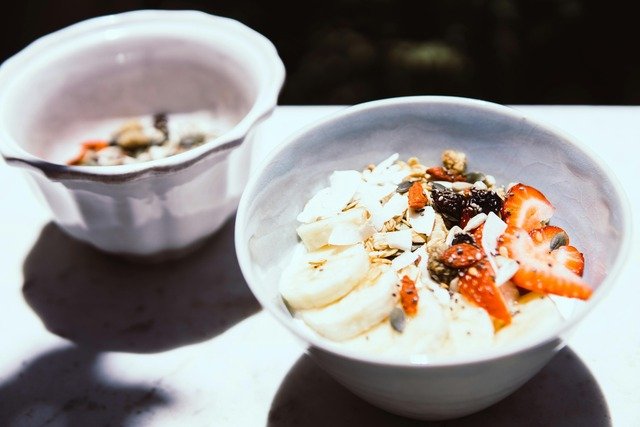Taking care of our health is no longer about spending time at the gym or getting enough sleep. Thankfully, we have woken up to the realization that what we put on our plates directly impacts how we feel and act every day. This is where we talk about functional food.
They are not just your specific snacks or food - they are packed with nutrients that are beyond basic nutrition. They can improve your ability to focus, support digestion, and even help you handle stress. Functional foods are redefined for busy professionals. If you juggle the time limit, meetings, and life requirements, your diet can be your most powerful tool to keep you energetic, concentrated, and healthy.

What Are Functional Foods?
Functional food is like a health booster in your routine. They don't just fill you – they actively support your body and brain. These foods are naturally rich in nutrients or enhanced with further benefits, which are designed for more than satisfying hunger.
Core properties
What makes a meal "functional"? Everything is about the intentions. These foods are selected not only for taste, but also because they help your body perform. Think of Omega-3 rich foods for brain health, probiotics for intestinal support, and antioxidants for fighting inflammation. Either natural or fortified, they are designed to promote better health and performance.
Categories of functional food
• Probiotic-rich foods: Yogurt, kefir, kimchi, and sauerkraut are the best picks for probiotics and digestive health.
• Adaptogenic foods: Ashwagandha, fungi, ginseng, and rhodiola are known for helping your body adapt to stress, perfect for stress handling with food.
• Fortified foods: Look for rich grains and juices with omega-3s, calcium, or vitamin D.
• Herbal supplements: Ginger, turmeric, and holy basil are natural inflammation fighters and brain amplifiers.

Health benefits of functional food
The right foods can fix health issues, boost mood, and improve your work performance as well. Here we discuss the several benefits of functional foods that you may like to save for future reference.
Promote immune function
Do you want fewer sick days and more energy? Nutrition-dense foods for professionals can strengthen their body’s defence system. You will find natural prevention in vitamin C, zinc, and probiotics, and they also support long-term well-being.
Indigestion
A healthy gut is equal to a healthier you. Probiotic-rich foods supply beneficial bacteria to your system, while prebiotics (such as garlic and bananas) feed them. The duo supports probiotics and digestive health, promotes absorption of nutrients, digestion, and even uplifts your mood.
Mental health and cognitive function
Need a mental edge? Omega-3 brain-rich foods, such as walnuts and flax seeds, can enhance focus, memory, and mood. Adaptogens also come here strongly, calm your stress reaction, and help you to think with clarity under pressure.
Prevention of chronic illness
Functional foods packed with fiber, antioxidants, and healthy fats can help reduce the risk of chronic diseases like cardiac issues, diabetes, and some cancers. They fight against inflammation and support balanced blood sugar – smart long-term investments in your health.

Growing Trend of Functional Foods in the Market
Far-reaching utilities of functional foods have attracted the markets’ attention, and why not? After all, food is the ultimate prevention and cure. Here’s a closer look at the fast-growing trend.
Consumer Demand
People want food that works as hard as they do. By 2025, the functional food market is expected to exceed $275 billion. The focus now moves from empty calories to powerful, targeted nutrition.
Product innovation
Innovation in the food world is exciting. From adaptogen-infused drinks to nootropic snacks, the makers offer smart energy, focus, and relaxation solutions. Functional beverages such as kombucha and turmeric lattes now provide benefits with every sip.
Charge-led
Brands like GT’s Living Foods, Olipop, and Vital Proteins make waves with products that combine convenience and function. They make it easier than ever to include functional foods in your everyday routine.

Popular Functional Foods and Their Uses
The benefits are real and simple, too. If you are still not clear about it, then do read this out.
Probiotic-Rich Foods
Your gut is often called your "other brain." Adding probiotic-rich foods such as miso soup, kimchi, or kefir can improve digestion, reduce bloating, and even support clear skin and mood control.
Adaptogens and Stress Relief
Handling daily stress? Adaptogens, namely Rhodiola and Ashwagandha, are natural stress-relievers. They help regulate cortisol, increase focus, and balance the mood, making them ideal foods for stress relief.
Functional Drinks
Now you have drinks that do more than quench thirst. Tea, kombucha, and herbal water infused with adaptogens or omega-3s are designed to help you stay calm, focused, or energetic, which you need the most.
Omega-3 Rich Foods
Seeds like flax and chia, and nuts like walnuts, are rich in omega-3. These help reduce inflammation, improve focus, and improve heart health and thus increasing productivity through diet.

Functional Foods and Professional Productivity
You have surely heard that ‘the food you eat is what you become.’ Well, it’s not just that, but it plays a pivotal role in your work performance as well.
Boosting Energy & Focus
Middle slump, anyone? Instead of reaching out for another coffee, switch to a handful of almonds, leafy vegetable salad, and chia seeds; they provide more stable, constant energy and mental clarity throughout the day.
Reducing Stress & Anxiety
Stress may be part of the job, but it is not to manage your day. Functional foods loaded with magnesium, probiotics, and adaptogens can help to cool veins and restore emotional balance.
Improving Sleep Quality
A good day begins with a nice night's sleep. Foods such as tart cherries and dark leafy vegetables promote better sleep by increasing melatonin and magnesium levels. And when you sleep better, you perform better.
How to Incorporate Functional Foods into Your Diet
If the term “functional foods” has scared you or given you the impression that it’s something alien, then you need clarity. Fear not, they are regular foods, but just that their specific and special benefits in improving your functions have been discovered lately. They are simple to incorporate and come with loads of benefits.
Simple ways to add functional foods
Small changes can make a big difference. Add the chia seeds to your morning smoothie that you enjoy. Sip some kefir with breakfast. Breakfast add-on can be fried chickpeas or walnuts. It's about choosing smart, not very difficult!
Meal planning
Plan food around the dense foods for nutrients, think of whole grains, lean protein, healthy fat, and lots of vegetables. Planning smart meals ahead to keep things sorted, cut down time thinking what to make the like.
Smart Snacking
Skip the vending machine. Keep functional snacks like adaptogen with omega-3 seeds or protein bars with nut mix handy for a quick snack. They fuel body and mind, without the sugar crash.

Potential Drawbacks and Considerations
Functional foods are the breakthrough in nutrition, but they have their limitations as well, and so are wrong information around them that may mislead you.
Overreliance on supplements
Although supplements can be useful, they should not replace real food. Complete foods provide a complex mixture of nutrients, fiber, and health benefits that the pills cannot match. Always aim for a balanced diet.
Quality and Sourcing
Not all products with "functional" are balanced. Read the component list. Choose organic, low-sugar sugar and clean-label options where possible.
Consulting a Healthcare Provider
Every individual’s body differs from others. Before adding new supplements or making major dietary changes, you can talk to a healthcare provider, especially if you have allergies or any other health issues.

Functional foods are more than what this discussion has talked about. They do it all – from increasing energy to stress handling, they provide practical ways to feel your best and perform the right way.
The best part? This does not require full lifestyle alterations. Add a teaspoon of flax seeds here, sip on a probiotic drink, or at night, relax with a calming cup of adaptogenic tea. Small alternatives and being consistent can have a great effect.
As we look towards the future, you can expect functional foods to take the center stage in corporate wellness discussions, school meals, and even mental health. Because when it comes to feeling good and doing your best, what you eat truly matters!


